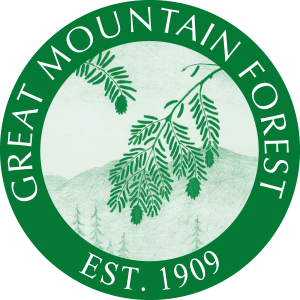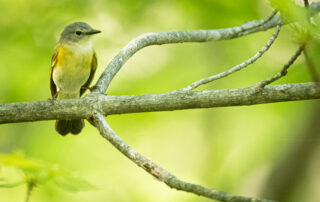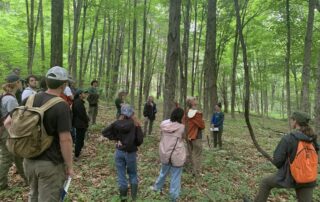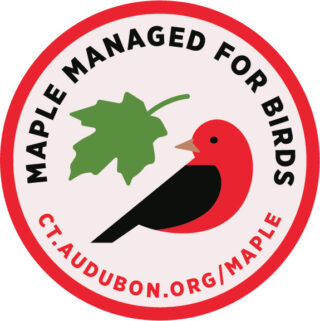Managing Forests for Birds

Photo by: Tom Blagden
Course Overview
Forests are dynamic homes to a great diversity of bird species, including many migratory birds that rely on our forests for breeding and migratory stopovers. Each has unique habitat needs shaped by forest age, structure, and composition. Whether you’re stewarding woodlands for timber, recreation, or personal enjoyment, this one-day course will help you better understand how your forest management choices can support birds throughout their life cycles.
Presented in partnership with Audubon Connecticut, this course will explore how different bird species rely on a range of forest conditions – from young regenerating stands to mature woodlands with standing dead trees and diverse canopy layers. We’ll examine the benefits of maintaining soft forest edges, promoting diverse tree species, and creating vertical structure to enhance habitat quality. The course includes practical guidance on assessing, creating, and maintaining habitat for bird communities within your forest.
The day will also feature a review of Audubon’s Bird-Friendly Maple program and highlight resources available to support bird-conscious forestry practices. Participants will leave with tools to assess their own woodlands and understand how managing for birds can complement broader objectives like timber harvest, recreation, and climate resilience.
Course Goals & Objectives
Understand habitat needs across bird species and forest types: Learn how young and mature forests each play a role in supporting bird communities.
Integrate bird-friendly practices with existing management goals: Discover how habitat enhancement for birds can be compatible with timber production, maple syrup operations, and other landowner objectives.
Access tools and resources to support bird-focused forestry: Gain knowledge of programs, partners, and technical guidance – shared by experts from Audubon Connecticut – to help implement bird-conscious forest management on your land.
Instructors
Dr. Eileen Fielding, Center Director, Sharon Audubon, Audubon Connecticut
Rosa Goldman, Senior Associate, Forest Program, Audubon Connecticut & New York
Physical Requirements
This course will be split between class time and field time, the latter inspecting past and planned forest management treatments. Participants must be able to walk over muddy and uneven terrain, up steep grades, off trail, and to stay on their feet for several hours. They should also be prepared for inclement weather.
Meals
Participants can bring their own lunch, but will also be given the option of ordering lunch from the Berkshire Country Store in Norfolk. Coffee, tea, and water will be provided.
Location
This course will be held at the historic Yale Camp in the heart of Great Mountain Forest. The camp is accessed via the forest’s West Gate to Chattleton Road, off Canaan Mountain Road, in Falls Village, CT (also known as Canaan). Participants will be sent directions.





